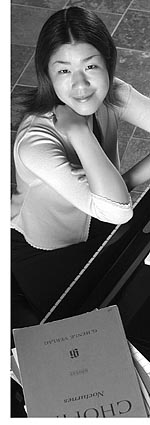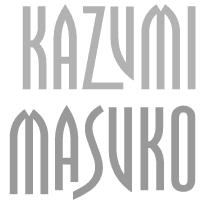



by Kazumi Masuko as told to Amanda Gibson
I composed my first piano piece when I was three years old. My parents are musicians, so it was very natural for me to start playing the piano. I grew up hearing all the music because of my parents. I started taking lessons when I was four.
I started the lessons because I wanted to. I enjoyed them until I was about ten, and then it got harder for me. When I was really little, I had to practice two or three hours every day, but as I grew older they wanted me to practice many hours every day. I tried to practice as much as I could. All my friends could go out and have fun after school, but I had to come home and practice. By the time I got to high school—I don’t know—I kind of lost my direction. I wanted to keep going though, and my parents definitely wanted me to go on, so I didn’t want to quit. I knew music was the only thing I wanted to live with even though I had a hard time.
I wanted to come to the United States to study English and music after I graduated from high school because I was interested in learning other languages, which is very important for a musician. I also had an interest in the style and system of education in the U.S. I wanted to experience music lessons from different teachers to build my skill and technique. I was interested in the Western style of musical education because it focuses on the internal meaning rather than only on technical things.
I couldn’t speak any English before I came here, so my parents were a little bit worried about me coming to the U.S. alone. They wanted to put me in a small city for safety, and my father’s musician friend knew Dr. Leonard Richter, so I came to Walla Walla College. At first I planned to go to Whitman because I didn’t know about Walla Walla College and also because I am not an Adventist. But there were no English as a Second Language classes at Whitman, and Walla Walla College did have one at that time. So I came to study English for one year, and somehow I stayed all five. I thought at times about transferring schools, but I ended up staying here because I liked it a lot.
I found many great things at Walla Walla College, and Dr. Richter was the biggest reason I stayed. I had worked very hard from a young age to have fast fingers and great technique, but sometimes I felt nothing in the music. I realized I was thinking too much about just playing the piece, and I wasn’t enjoying the music. At some point after I started studying with Dr. Richter, my mind was changed. Before, I wasn’t thinking anything, but as I studied with Dr. Richter, I found my mind was filled with thoughts about the music and where I was going. My mindset just changed, and everything was easier from then on. It’s interesting how meeting Dr. Richter changed my life. I wasn’t truly focused on music before, and he helped me a lot—not only with musical technique, but mentally with the way I should practice. He’s so detailed. And he cares about his students so much. I felt like I wanted to do well for him. If I hadn’t come here and taken lessons from him, I wouldn’t be as focused now. I also learned a lot from all of the great teachers in the music department.
During my freshman year here [at WWC] I got to play for the Spokane Youth Symphony. It was the first time in my life that I played with an orchestra, and it was really fun. It’s totally different from a piano solo or piano duet. I felt so much power and energy from all the instruments and people. I felt we were making one music together. Working with the conductor was fun because he listened to us a lot. I could say what I wanted to do, like how I wanted to express a phrase, and I had the freedom to do that. I played with the Walla Walla Symphony my junior year and with the North Inland Orchestra my senior year. All these experiences were very special to me.
I wish that I could play for the symphonies again, but I graduated this last year, so I won’t be able to. I think I’m going to graduate school next year in Germany, and maybe I will perform or do chamber music, playing with other instruments, like strings, or accompanying. I also enjoy composing and teaching.
There are many reasons for me to play music for other people. First of all, I believe music can change our feelings. When I play the piano, I can’t play without emotion. For each piece, I try to understand what the composers meant, what they were thinking when they wrote and played these songs. There is always background and some kind of intended meaning for music, so I always connect myself to each piece using my heart and mind and also all the information I can find about the piece.
The performer and the audience do not feel music in the same way, but I don’t think they have to. Since there are so many ways to play the music, there should be different ways to accept it too. With instrumental music, it is almost impossible to convey the real meaning because there are no words. On the other hand, there is unlimited freedom to feel. I want the audience to feel my excitement, happiness, joy, anxiety, or sorrow in the music.
Also, I think the performer is the transmitter of historical music. A lot of the music I play was composed a long time ago, and much has changed between now and then. For example, the instruments are different now.
We, the musicians, can use our new instruments to share with the audience each style, technique, tone, form, and the differences in older instruments. I can try to play a piece on the piano the same way Bach played on the harpsichord. I have to use a different technique to reproduce his music, but it is not totally impossible. I think the performer should study and understand the historical background style, then try to play as the composer meant. Performers have the responsibility to convey history to the audience through the music.
It’s hard to keep doing one thing your whole life. In high school I was so stressed about everything; my teachers, my parents, everyone just said I had to work hard and practice. And I was tired of all those things. But if I had stopped at that time, I would have missed one of the great joys of my life.
Simply, I like to make music. I like to play music. I enjoy playing the piano. I am not playing the piano only for the audience, but also for myself, for joy of my life! If people like my music, that will accomplish two wonderful things at once. I can enjoy making music, and they can enjoy it too. W
Kazumi Masuko is a 2002 music graduate. After a summer at her home in Japan, Kazumi plans to live in Europe, where she will continue her music studies.
Amanda Gibson is project coordinator in the Walla Walla College Office of College Relations and production manager of Westwind.